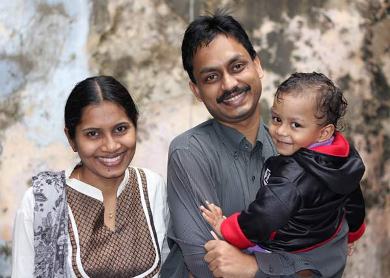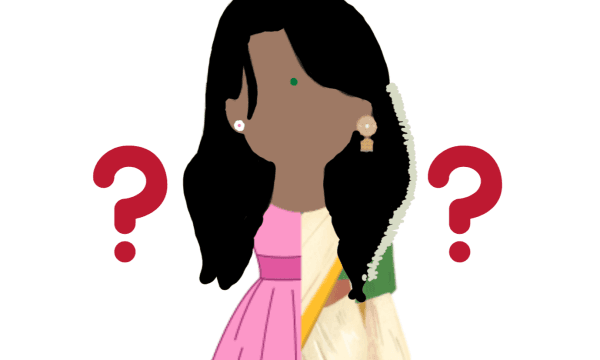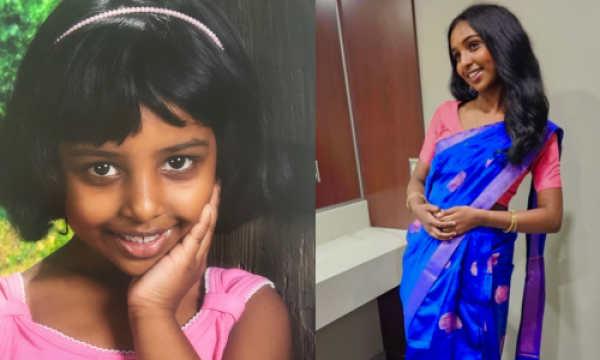
Senthoorselvan Selvaratnam looked at his new name again. It must have been the hundredth time that he had scribbled his new name and looked at it. He read it aloud in his quiet and dimly lit room. It sounded awkward at first. Soon it started to seem reasonable. He felt satisfied by his new name “Sen”. It was pronounceable, and it had just three letters compared to his real name. “Now, nobody will ask me what my Canadian name is,” he thought.
He did not feel any remorse in shortening his name. There were reasons why he had to cut it short. Almost all of the students in his class had a hard time remembering his name, let alone pronouncing it properly. Some kind souls who would try to call him by his name would stop in the middle to take a quick breath. The politically correct types referred to him as the guy with dark hair in their conversations. To the not so politically correct, he was “that Indian guy with glasses”.
His math teacher often was embarrassed about not being able to remember his name. His gym teacher said “Hi there” whenever she passed by him, even though she addressed others by their names. It did not bother him in the beginning. But soon it started to worry him for the thought he had no identity without his name.
There were other worries as well. He was faced with the daunting task of spelling his name to the administrators at school. When asked for his name, he would say “It’s Senthoorselvan. S as in Sam. E as in Elephant. N as in Nancy…” Soon he started to carry a piece of paper with his name written in capital letters. When faced with a request for his name, he would simply take that piece of paper and give it to them. “Here you go,” he would say with a smile outside and a frown inside.
It wasn’t just Canadians who had trouble with his name. Even computers had trouble accepting his name. The computers thay the administrators used would take only 10 letters for first names. “Poor programmers,” he would think. “They did not anticipate Tamil names.”
His parents had reasons to name him Senthoorselvan. Certainly, his father was a happy man when his first son was born. He looked into his child’s eye and named him Senthoor. He dreamed that his son would accomplish whatever he could not achieve in his life. He wanted him to become Prime Minister of Sri Lanka. His mother, the pious lady that she was, consulted the head priest in her village and added “selvan” to her son’s name. Thus, he became Senthoorselvan. She hoped that he would become a good doctor and serve the entire village.

Their hopes disappeared the moment the Selvaratnam family moved to Canada. Senthoorselvsan’s first day changed his perceptions of the country. He expected to see people the colour of snow travelling by cars on highways alongside people travelling by dogsleds. But he saw people of different colours: white, black, brown, yellow. They came in all sizes. His high school resembled a mini-United Nations with names that paralleled a UN roll call. Senthoorselvan felt comfortable in the new cosmopolitan environment – an environment that appeared perfect to accept him.
It did not take him long to realize that this environment was just a mirage. Like a poor man’s image of wealth, it was an immigrant youth’s mirage of acceptance. Six months had passed since he came to Canada and joined the high school. There was no one in his class for him to call a friend, or even to call an acquaintance. No one came and talked to him. Even the talkative guy next to him in class talked to each person at every side of his desk, but not to Senthoorselvan.
He felt lonely. Soon, he began to have a feeling that he was unwanted and unwelcome in his new land. Each day reinforced that he was an outsider, different from everyone else. When his math teacher asked a simple question in algebra class, he would not answer. He did not want others to hear his rough, accented voice. “What if the class finds out I’m an outsider? A new kid in the class of established kids.” So he kept silent. Soon his worries started to depress him.
Senthoorselvan found it hard to adjust to this new land. He felt like a wild rabbit that had grown up in the forest that had been caught and made to grow in a house. The change in climate, language and culture baffled him. But he wanted to fit in, be accepted and to succeed in life.
Days passed. Seasons changed. Summer was too hot to bear. Fall was balmy, but soon it started giving way to winter. The enthusiasm and optimism he felt when he started high school began to fade. Senthoorselvan was not ready for the harsh winter ahead. Neither was he ready for another depressing semester.

One day, he sat in his quiet and dimly lit room with thoughts about his life ahead. The “tick, tick” from the clock did not interrupt his thoughts. Suddenly, a thought struck him like a lightning bolt. “Maybe it is my fault that no one talks to me,” he thought. “It is time that I start going around and introducing myself. Maybe I should let everyone know who I am… The first step towards that direction is to change my name. Perhaps shorten it,” he thought. He wrote his full name down on a sheet of paper and scratched out all the letters except the first three.
The response was overwhelming. Senthoorselvan noticed a perceptible change in his classmates’ attitude towards him. Soon, “Sen” became as much used as “Mike” and “John” and “Jennifer” in his class. It became acceptable to everyone with different cultural backgrounds.
Ms. McLennan, the math teacher who was sympathetic to immigrant students, stopped by and talked to him, often dropping his name in conversation. The student of Chinese heritage who sat next to him called him “Zen.” The gym teacher winked and said “Hi Sen” when she passed by Senthoorselvan in the hall. The group of black students near the locker greeted him in unison, “What’s up Sen?” Melissa, the blonde and undeniably the most beautiful girl in class, asked him if he had an extra pen to borrow. He gave her his black pen. “Here is another one, in case that one runs out of ink.” He gave her another pen.
Senthoorselvan could not have asked for more. He started to make new friends and gradually felt himself being pulled into the Canadian mosaic. He felt as if the entire global community was accepting his new name.
Three weeks later, Sen expected a call from Melissa. Both of them had planned to work on a chemistry presentation. Noticing she had not called, Sen asked his mother if anyone had called for him. His mother, busy with wiping the dishes in the kitchen, continued wiping the plates without looking at the impatient Sen. “Not that I can think of,” she said, once she was finished with her first dish. “Ah, but someone keep calling us and asked for Shen or Shan or Zen.”
Sen’s face turned pale. His eyebrows went up. “Sen,” he said in a raised voice. “That’s me. I’m Sen.”
His mother looked at him in bewilderment. “You’re Sen? What are you talking about? You’re not Sen,” she said, shifting all her attention from the dishes to her son.
“Yes, I’m Sen. I shortened my name so that Canadians will know me, recognize me,” he said with shoulders shrugged.
His mother could not understand the thoughts of a youth eagerly trying to fit in. Neither did she bother to try to understand them. “But we did not name you Senthoorselvan for no reason. Your name represents our religion. You were named after Lord Murugan.” She continued on.
But Sen did not continue to listen. He began walking to his room with his mother’s voice receding in the background. He sat on his chair, but could not resist laughing at the irony: When the whole world had now accepted his name, his parents would not accept it.
- R. Nada
Related articles:
What’s in a Name? 10 Things You Have to Deal With If You Have a “Foreign” Name Finding Tamil Identity

























